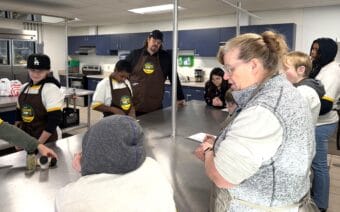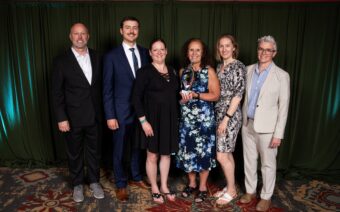
December 27, 2023
GREEN BAY – For nearly two decades, the Lions Eye Bank of Wisconsin – a nonprofit that facilitates corneal transplants and provides tissue and organ donation education – recognizes individuals that promote the organization’s mission of giving the gift of sight, with the Crystal Vision Award.
Dr. Michael Vrabec from Valley Eye Associates – which has locations in Appleton, Green Bay and Oshkosh – was recently honored as the 2023 recipient.
Vrabec – who has worked as an ophthalmologist with Valley Eye Associates for nearly three decades – was recognized for his work with Orbis International, a nonprofit organization dedicated to saving sight worldwide.
According to its website, Orbis’ programs focus on the prevention of blindness and the treatment of blinding eye diseases in developing countries through hands-on training, public health education, advocacy and local partnerships.
Since 1982, Orbis has provided medical and optical treatment to more than 23.3 million people in 92 countries.
“I feel extremely honored to receive the Crystal Vision Award,” the Beaver Dam native said. “I’ve always promoted eye banking in Wisconsin and have done training throughout the world teaching corneal transplant techniques and good eye banking techniques. I feel the award is recognizing a quarter century of my passion, so for that, I am thankful.”
A corneal (the transparent, dome-shaped surface of the eye) transplant, Vrabec said, is an operation to replace part of the cornea with corneal tissue from a donor.
Light enters the eye through the cornea, and it plays a large role in the eye’s ability to see clearly.
“I wake up everyday thankful for what I can do – I love helping people…,” he said. “It’s an honor and blessing doing what I do, and I don’t take it for granted.”

Dr. Michael Vrabec
Vrabec said he credits much of his success, and the Crystal Vision Award recognition, to the eye bankers.
“I have so much respect and admiration for the eye bankers,” he said. “They are the ones behind the scenes and the unsung heroes. I might be the first one (patients) see when they take off their eye patch, but the eye bankers process tissue at all hours of the night, distribute it, etc. When I accept a cornea in Appleton, sometimes it takes three or four volunteer Lions (drivers) to transport the tissue to me.”
An ‘eye’ toward the future
Starting at Valley Eye Associates in summer 1994, Vrabec said he knew at a pretty early age he would work in the medical field in some way.
“My father was a family physician, so I knew a lot about the medical field going into college,” he said. “I have several sisters who are doctors – pretty much everyone (in my family) is in the medical field in one way or another.”
Vrabec said a corneal transplant he witnessed while in medical school, set him on his career path.
“I thought, ‘this is one of the most elegant procedures I have ever seen,’” he said. “‘What a great way to impact and improve someone’s life.’ From that moment on, I looked at a career in ophthalmology.”
Vrabec obtained his degree in ophthalmology from the University of Wisconsin-Madison, where he also completed his residency.
He completed fellowships in corneal transplantation at the University of Iowa and another fellowship in refractive surgery at the Hunkeler Eye Center in Kansas City, Missouri.
Vrabec is also a fellow of the American College of Surgeons and is certified by the American Board of Eye Surgery.
“I was also on the faculty at the University of Vermont where I led the corneal service for six years,” he said. “My wife – also from Beaver Dam – and I enjoyed Vermont, but we got homesick for Wisconsin and moved back.”

Dr. Michael Vrabec performs a corneal transplant. Submitted Photo
At Valley Eye, Vrabec specializes in small incision, no-stitch, no-shot High Definition Laser Cataract Surgery™, refractive surgery, corneal transplantation and other types of laser surgery.
Over the years, Vrabec said he has performed more than 30,000 refractive procedures and nearly 50,000 cataract surgeries.
He said he was also the first doctor in Wisconsin to perform iLASIK, High Definition Laser Cataract Surgery, INTACS, ECP laser treatment, the Verisyse implantable contact lens and the Fugo blade.
Vrabec also performed the first laser-assisted cornea transplant in Wisconsin and was the first surgeon in the state to be included in an FDA study on corneal collagen crosslinking (a treatment for keratoconus), demonstrating his commitment to bringing patients the best eye technology the world has to offer.
Anyone can be a donor
Contrary to what some folks might think, Vrabec said “most anyone can be an eye donor.”
“Maybe if you’re too old, your cornea might not be usable for a transplant, but there are other parts of the eye that can be used, like for glaucoma surgery,” he said. “Also, there is a big need for research on hereditary eye diseases, so sometimes eyes can be used for research and training purposes. If you’re undergoing a procedure, you certainly don’t want it to be the first surgery your doctor is doing.”
Vrabec said there is a shortage of donors nationwide, but Wisconsin is in “pretty good shape” in that area.
“Creating awareness is key,” he said. “Having a person donate, and subsequently, the family gets a letter saying their son or daughter’s donation helped save or improve a life can help the family maybe move on quicker and give them some peace. In Wisconsin, we have more donors than recipients.”
Because Wisconsin has more donors than recipients, Vrabec said eye tissue is exported out of the state to other eye banks.

Dr. Michael Vrabec is shown here climbing Mount Rainier in Washington Mount Rainier’s elevation is 14,411 feet. Submitted Photo
“On your next commercial (airline) flight, there’s a good chance there might be a pair of eyes sitting up front with the captain going to another eye bank,” he said. “That’s fine, as long as you stay within that five to seven-day period between when the eyes are put in the preservative until they are used.”
Orbis, Vrabec said, has a flying eye hospital where surgeries can be performed right on the plane.
“Fed-Ex donated Orbis’ current airplane where in the back of the plane, there is an operating room, and the classroom up front has room for 50 doctors,” he said. “I’ve done many corneal transplants throughout the world hooked up to a microphone and camera while describing the surgery and answering questions as it’s proceeding.”
During his time with Orbis, Vrabec said he has performed corneal transplants all over the world.
“I’ve been to several Caribbean countries – Cuba, Jamaica,” he said. “I’ve been to Ethiopia and Nigeria in Africa, China several times, India – pretty much every continent but Antarctica.”
More information on Orbis International can be found at orbis.org.
For more on the Lions Eye Bank of Wisconsin, visit lebw.org.
 It’s official: Rice Lake ‘is on the map’
It’s official: Rice Lake ‘is on the map’ Sereno Steindl recognized as Safety Professional of the Year
Sereno Steindl recognized as Safety Professional of the Year








